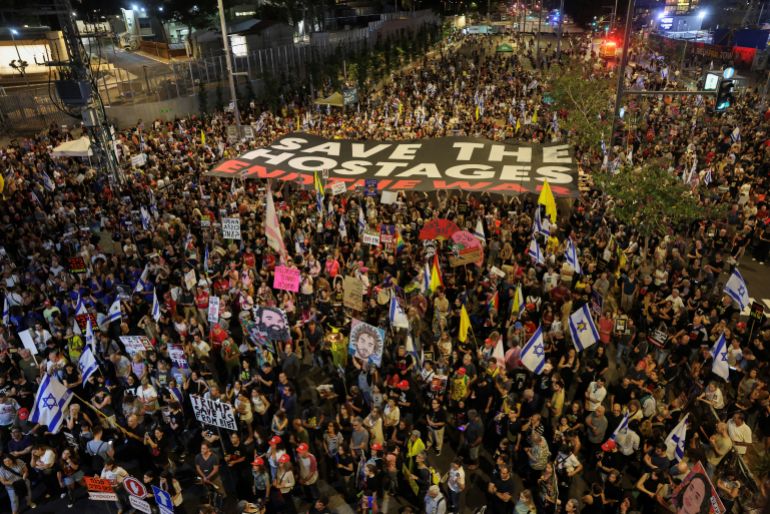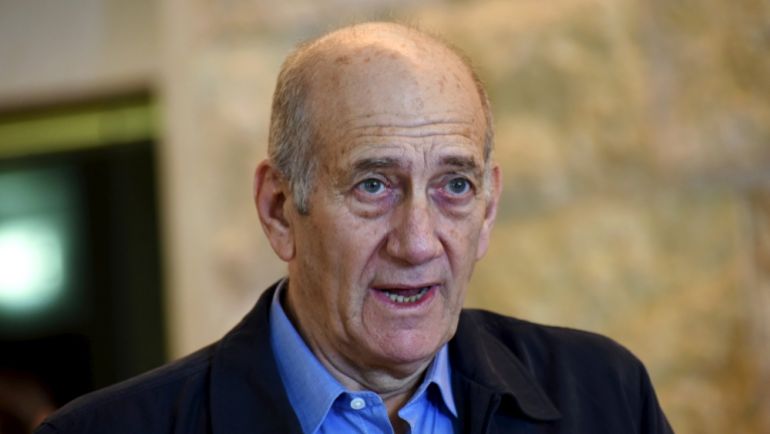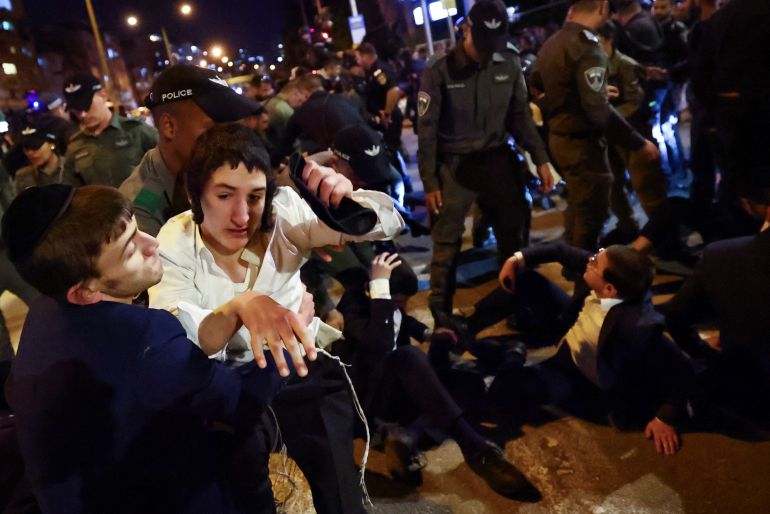Netanyahu: Israel informed US of Iranian strikes in advance
Israeli PM Netanyahu said Friday’s strike on Iran was months in the making and that the US was informed in advance.
Source link
Israeli PM Netanyahu said Friday’s strike on Iran was months in the making and that the US was informed in advance.
Source link
Wherever Israeli Prime Minister Benjamin Netanyahu looks, trouble seems to be looming.
Criticism of his government’s war on Gaza is mounting, with charges of genocide and war crimes coming from both foreign leaders and former Israeli prime ministers.
Internationally, Israel is looking increasingly isolated, as images of the starvation it is inflicting on Gaza flood global media.
Domestically, Netanyahu faces deep criticism of a war many believe he is only prolonging to stay in power.
Legally, the prosecution in his corruption trial has begun its cross-examination of him, while politically, he is facing a possible collapse of his governing coalition.
Netanyahu has never seemed so embattled in his career, but is this really the end for Israel’s longest-serving prime minister?
Here’s what we know.
Very, and it’s growing.
Netanyahu has long been accused of manipulating the war in Gaza for his political ends, an accusation that gained new momentum since March, when Israel broke the ceasefire with the Palestinian group Hamas, further endangering the captives held in Gaza.
In late May, a poll for Channel 12 television showed a majority of Israelis thought Netanyahu cared more about retaining his grip on power than returning the captives.
Most of the protests held in Israel have focused on the captives taken during the Hamas-led assault of October 7, 2023, and how extending the war for political motivations endangers them.

But recently, a small but significant number of Israelis have also protested against the intense suffering their government is inflicting upon the people of Gaza. In addition to an open letter from the country’s academics denouncing Israel’s devastation of Gaza, a growing number of photographs of Palestinian children are being held by demonstrators as part of wider Saturday night protests against the war in Tel Aviv.
Even members of the military are growing unhappy with the war in Gaza.
As reports of reservists refusing to fight increased, open letters by current and former officers in various divisions appeared, calling for an end to the war.
Two of Israel’s former prime ministers have recently publicly criticised Netanyahu.
Ehud Barak, a former general and prime minister from 1999 to 2001, said in Time magazine that Netanyahu must choose between a deal brokered by United States President Donald Trump to free the captives and end the war, or continuing with his politically motivated “war of deception”.

Ehud Olmert, prime minister from 2006 to 2009, wrote in Haaretz that Israel was guilty of having committed war crimes in Gaza and that: “This is now a private political war.”
“A sane country does not wage war against civilians, does not kill babies as a pastime, and does not engage in mass population displacement,” former general and leader of the Democrats party, Yair Golan, told local radio station Reshet Bet.
He was referring to the stated plans of far-right ministers like Finance Minister Bezalel Smotrich and National Security Minister Itamar Ben-Gvir to expel Palestinians from Gaza in order for Israelis to settle it.
Olmert added on Tuesday that Trump should tell Netanyahu that “enough is enough”.
For years, Israel has been divided over the conscription of its ultra-Orthodox youth, who were exempt from military service if they were full-time students in religious schools or yeshivas.
In June 2024, Israel’s Supreme Court ruled that the exception could no longer apply, fulfilling a longstanding demand by secular Israelis who protested against the double standard.

But the leaders of the two ultra-Orthodox parties in the ruling coalition, Shas and United Torah Judaism (UTJ), are threatening to collapse the government unless it passes legislation that would override the Supreme Court decision.
It is unclear whether elections would result in a parliament more sympathetic to the ultra-Orthodox, but recent developments, like plans to increase the number of conscription notices to ultra-Orthodox students, have pushed the issue to the fore.
Arab and European leaders have become increasingly vocal in their criticisms of Netanyahu and the war.
However, for now at least, he still has the vital support of the US and President Donald Trump.
In early May, Saudi Arabia and the Arab League slammed Netanyahu after he suggested that expelled Palestinians would be able to settle in Saudi territory.
Later the same month, Canada, France, and the United Kingdom, who had all previously supported Israel’s war on Gaza, issued a statement describing the level of human suffering in the enclave as “intolerable”.
Spain and Ireland, which, along with Norway, recognised a Palestinian state in May 2024, have also called for action to be taken against Israel and the Netanyahu government.
The UK, along with Australia, Canada, New Zealand and Norway, also announced on Tuesday that they would impose sanctions on Smotrich and Ben-Gvir.

How long Netanyahu will keep Trump’s support, however, is not clear, as speculation that the mercurial US president may be tiring of Netanyahu is widespread and growing.
Netanyahu has been embroiled in multiple corruption investigations since 2019. If he is found guilty, he faces jail, possibly up to 10 years.
His trial, which began in 2020, has faced numerous delays due to the COVID-19 pandemic and, more recently, the war on Gaza, which he is accused of extending and at times exacerbating precisely to avoid his trial.
Critics also say he is extending the war to avoid being held accountable for his government’s failings during the October 7 attack.
Controversy and scandal have followed Netanyahu throughout his political career, and opposition to his rule is growing within Israel and parts of the West, yet he may still survive, observers say.
However, to do so, Netanyahu must retain US support for his government while sustaining a war that Trump appears to want ended.
“I don’t know if Netanyahu can come back from this,” one of his former aides, Mitchell Barak, told Al Jazeera in May.
“There’s a lot of talk about Netanyahu being at the end of his line … They’ve been saying that for years, and he’s still here … but I can’t see any more magic tricks that are available to him.”
Israel’s war on Gaza rumbles on, even as international condemnation grows.
Hamas has expressed that it is ready for a deal to end the war, even offering to turn over the administration of Gaza to a technocratic government. United Nations Security Council members have overwhelmingly voted in favour of a ceasefire, a resolution blocked from passing only by a United States veto.
But Israel, led by Prime Minister Benjamin Netanyahu, is adamant in its refusal of any agreement that does not include what it calls the “defeat of Hamas”, even if that means endangering the Israeli captives still held in Gaza.
“Hamas is already the weakest it’s ever been, and there’s nothing they can do that is remotely comparable to what Israel possesses,” writer and researcher on Israel-Palestine and founder of The Fire These Times podcast Elia Ayoub told Al Jazeera.
“There’s ample evidence by now that the only reason this genocide is ongoing is because Netanyahu wants it to continue. It’s clearly just an excuse to keep the war going.”
But why would Netanyahu want the war – which is Israel’s longest since 1948, and is causing economic crisis – to continue?
One answer is that the war provides a distraction from Netanyahu’s own problems.
Israel’s longest-serving prime minister has well-documented legal troubles; he is being tried for corruption.
And, aside from that, should a permanent ceasefire be realised, some analysts believe Israeli society will hold Netanyahu accountable for security shortcomings that led to October 7.
“He’s afraid once it’s done, eyes will rightfully turn to him over corruption and the failures of October 7,” Diana Buttu, a legal scholar and former adviser to the Palestine Liberation Organization, said.
And so, Netanyahu has two main tasks. The first is to prolong the war, allowing him to continue using it as an excuse to avoid accountability. The second is to prevent the breakup of his government, while somehow setting himself up for another successful election, which must happen before October 2026.
Netanyahu has been “reliant upon Hamas throughout the war”, Mairav Zonszein, an expert on Israel and Palestine for the International Crisis Group, told Al Jazeera.
“The far right and Netanyahu have consistently used Hamas as an excuse not to negotiate or plan for a day after,” she said.
The Israeli refusal to negotiate a final end to the war stands in stark contrast to Hamas’s willingness to hand over all captives held in Gaza.
Over the last 20 months, much of Hamas’s leadership has been killed. Ismail Haniyeh, Hamas’s political leader, was assassinated in Tehran on July 31, and Yahya Sinwar, his successor, was killed in Gaza on October 16.
Israel is now claiming it killed Sinwar’s successor and younger brother, Mohammed, though Hamas has yet to confirm his death.
Militarily, analysts say, Hamas is estimated to have lost significant strength. It is still conducting some attacks, but fewer and further between than the ambushes it was able to carry out earlier in the war.
In a sign that Hamas perhaps understands that it is no longer in a position to rule Gaza, it has also offered to step down from the administration of the Palestinian territory, which it has controlled since 2006, and hand over to a technocratic government.
“The technocrat offer is not new,” Hamzé Attar, a Luxembourg-based defence analyst from Gaza, said.
“It was on the table since before the invasion of Rafah [which occurred on May 6, 2024]. They want Hamas to give up their arms and give up everything, and Hamas has responded by saying: ‘We’re stepping aside.’”
That has been firmly rejected by Israel, which has not endorsed any vision for post-war Gaza.
Instead, over the last nearly 20 months, Israel has killed more than 54,300 Palestinians and wounded more than 124,000 in Gaza, according to the territory’s Health Ministry.
In addition, Gaza is now “the hungriest place on Earth”, according to the UN, all its inhabitants at risk of famine after Israel strangled aid delivery throughout its war, then completely blocked it from March 2 until May 27.
Israel has also turned 70 percent of the enclave into no-go zones.
All the while, Israel’s bombing of Gaza continues.
Discounting the pretext of destroying Hamas and returning the captives, some analysts believe there is a deeper goal: pushing Palestinians out of Gaza.
“Neither Hamas nor the hostages are the targets,” Meron Rappaport, an editor at Local Call, a Hebrew-language news site, said.
“The goal is to push the people of Gaza into very few, small and closed areas where food will be delivered scarcely, hoping that the pressure on them will get them to ask to leave the Strip.”
“Israel is no longer fighting Hamas,” he added.
Netanyahu said in late May that Israel would control the entirety of Gaza by the end of its latest offensive, while many foreign officials and experts have warned either directly or implicitly that Israel’s actions amount to ethnically cleansing Gaza.
A recent report in Haaretz, the Israeli newspaper, cited 82 percent of Jewish Israelis supporting the expulsion of the people in Gaza.
To do so would have a historic impact, Buttu said, one that Netanyahu might feel he can portray as protecting Israel from a Palestinian state – something he has repeatedly promised to prevent.
“He recognises he will be the fall guy or the hero,” Buttu said. “If he is the one who ethnically cleanses Gaza, he becomes the hero.”
Until that happens, analysts believe, Palestinians will continue to die at the hands of the Israeli military. Hamas is the pretext and their willingness to negotiate or succumb is of secondary importance.
“Benjamin Netanyahu has no intention of ending this war,” Zonszein said. “It doesn’t matter what Hamas offers. They can offer to return all the hostages or give up governance.
“This war is going to continue until Netanyahu is forced to stop it, and that can only come from Trump.”
Additional reporting by Simon Speakman Cordall
Israel’s Prime Minister Benjamin Netanyahu has said the country used armed gangs in Gaza to help fight Hamas, his admission coming after a new wave of military strikes on the besieged Gaza Strip that left at least 52 Palestinians dead.
Netanyahu said the government had “activated” powerful local clans in the enclave on the advice of “security officials”, his video statement posted to X on Thursday coming hours after former Defence Minister Avigdor Lieberman accused him of deploying the tactic.
The statement marked the government’s first public acknowledgement that it had backed the armed Palestinian groups based around powerful families, which stand accused by aid workers of carrying out criminal attacks and stealing aid from trucks as starvation stalks the entire territory due to a punishing Israeli blockade.
An Israeli official cited by news agency The Associated Press said that one of the groups Netanyahu was referring to was the so-called Popular Forces, led by Yasser Abu Shabab, a local clan leader in Rafah.
Last month, Israeli newspaper Haaretz reported on the group’s activities – though it was named the “Anti-Terror Service” in the report – saying that sources in Gaza claimed it consisted of roughly 100 armed men operating with the tacit approval of the Israeli military.
In recent weeks, the Abu Shabab group announced online that its fighters were helping protect supply shipments to new US- and Israel-backed distribution centres run by the shadowy Gaza Humanitarian Foundation (GHF).
“The Israeli opposition claims that there was no consultation within the Israeli government or the Israeli cabinet,” said Al Jazeera’s Hamdah Salhut, reporting from Jordan’s capital Amman. “Netanyahu says that these armed gangs … could essentially help the Israelis defeat Hamas in Gaza.”
“But it’s not going down well within Israel, where people are saying that these are armed criminal enterprises within the Gaza Strip. That they should not be armed and that these are Israeli weapons that are being put in their hands,” she said.
Netanyahu made his statement on another deadly day in Gaza, the military hitting targets throughout the besieged coastal enclave where the crippling blockade has brought the population to the brink of mass starvation.
Deadly incidents, killing more than 100 and wounding many more, at aid distribution sites run by the GHF since last week have sparked widespread condemnation, with Israeli troops opening fire on Palestinians seeking aid on four separate occasions since last week.
Chris Gunness, former spokesperson for the UN agency for Palestinian refugees (UNRWA), told Al Jazeera that the operations of the Gaza Humanitarian Foundation had turned Gaza into a “human abattoir”.
“Hundreds of civilians are herded like animals into fenced-off pens and are slaughtered like cattle in the process,” he said.
Amid growing international condemnation, GHF shuttered operations for a full day on Wednesday, saying the next day that it would reopen two aid distribution centres in the Rafah area of southern Gaza. It did not say when aid distribution would resume.
At least 52 Palestinians were killed on Thursday, according to hospital sources who spoke to Al Jazeera. The sources said 31 bodies had arrived at Nasser Hospital in Khan Younis, with 21 admitted to Gaza City’s al-Ahli Arab and al-Shifa hospitals.
Israel killed four journalists in an attack on al-Ahli Hospital itself, also known as the Baptist Hospital, in Gaza City
Gaza City local Fadi al-Hindi told Al Jazeera that he had seen one of the strikes on al-Nasser Street, near the al-Shifa Hospital, witnessing scenes of death after running outside his tent to check on his children.
“When I arrived, I saw a man in pieces; he had been riding a bicycle, and the lower half of his body was gone. Everyone in the street was injured, and we started to collect the pieces of the wounded,” he said.
At least three Palestinians were killed in the strike, reportedly including children.
The Palestinian news agency Wafa also reported five deaths in areas around Khan Younis, four west of Beit Lahiya in the north, and one south of Gaza City, as well as the injuring of a child near Bureij in central Gaza.
Wafa also reported that Israeli forces opened fire on Palestinians trying to reach an aid centre near Wadi Gaza.
In the meantime, Hamas chief Khalil al-Hayya has said in a prerecorded speech that the group did not reject a proposal for a ceasefire in Gaza put forward by US special envoy Steve Witkoff, stating that it had instead requested some changes to ensure an end to the war.
Al-Hayya added that Hamas is ready to engage in further talks and that communications with the mediators are ongoing. Israel broke off a previous truce in March to resume the war in Gaza.
More aid distribution sites are being set up in Gaza with US support, according to Israeli Prime Minister Benjamin Netanyahu. He described “some loss of control” after Palestinians desperately swarmed a new aid hub in Rafah following nearly three months of Israeli blockade.
Published On 27 May 202527 May 2025
Homeland Security Secretary Kristi Noem says the US president ‘wants peace’ but will not allow Iran to obtain a nuclear weapon.
Washington, DC – United States Secretary of Homeland Security Kristi Noem says she delivered a message from President Donald Trump to Israeli Prime Minister Benjamin Netanyahu that the two countries should be aligned on how to approach Iran.
Noem, who concluded a visit to Israel on Monday, told Fox News that her talks with Netanyahu were “candid and direct”. Her comments come days after US and Iranian officials held their fifth round of nuclear talks in Rome.
“President Trump specifically sent me here to have a conversation with the prime minister about how those negotiations are going and how important it is that we stay united and let this process play out,” she said.
On Sunday, Trump suggested that the talks were progressing well.
“We’ve had some very, very good talks with Iran,” the US president told reporters. “And I don’t know if I’ll be telling you anything good or bad over the next two days, but I have a feeling I might be telling you something good.”
Last week, CNN reported, citing unidentified US officials, that Israel was preparing for strikes against Iran’s nuclear facilities, despite the US-led talks.
Iran has promised to respond forcefully to any Israeli attack, and accused Netanyahu of working to undermine US diplomacy.
Iranian Minister of Foreign Affairs Abbas Araghchi said last week that the Israeli prime minister is “desperate to dictate what the US can and cannot do”.
Israel has been sceptical about the nuclear negotiations, and Netanyahu has been claiming for years that Iran is on the cusp of acquiring a nuclear bomb. Israeli officials portray Iran – which backs regional groups engaged in armed struggle against Israel – as a major threat.
On Monday, Noem said that the US understands that Netanyahu does not trust Iran.
“The message to the American people is: We have a president that wants peace, but also a president that will not tolerate nuclear Iran capability in the future. They will not be able to get a nuclear weapon, and this president will not allow it,” she said.
“But he also wants this prime minister, Benjamin Netanyahu, to be on the same page with him.”
A major sticking point in the talks has been whether Iran would be allowed to enrich its own uranium.
US officials have said they want Iran not just to scale back its nuclear programme, but also to completely stop enriching uranium – a position that Tehran has said is a nonstarter.
Enrichment is the process of altering the uranium atom to create nuclear fuel.
Iranian officials say enrichment for civilian purposes is a sovereign right that is not prohibited by the Nuclear Non-Proliferation Treaty (NPT).
Tehran denies seeking a nuclear weapon, while Israel is widely believed to have an undeclared nuclear arsenal.
During his first term, in 2018, Trump nixed the Joint Comprehensive Plan of Action (JCPOA), which had seen Iran scale back its nuclear programme in exchange for the lifting of international sanctions against its economy.
Since then, the US has been piling sanctions on Iran. Tehran has responded by escalating its nuclear programme.
On Monday, Iran ruled out temporarily suspending uranium enrichment to secure an interim deal with the US.
Iranian Foreign Ministry spokesperson Esmaeil Baqaei stressed that Iran is not buying time with the talks.
“We have entered the course of talks seriously and purposefully with the intention of reaching a fair agreement. We have proved our seriousness,” Baqaei was quoted as saying by the Tasnim news agency.
We compare and contrast how US President Trump treated the Israeli prime minister in the Oval Office versus other foreig
Source link
Hostages and Missing Families Forum called for a ‘return to the negotiating table’.
Families of Israeli captives held in Gaza have intensified their criticism of Israeli Prime Minister Benjamin Netanyahu amid large protests across the country, as the expanded military ground offensive and deadly bombardment in the Palestinian territory put the release of their loved ones at risk.
On Saturday, protesters took to the streets in Tel Aviv, Shar HaNegev Junction, Kiryat Gat, and Jerusalem, with members of the Hostages and Missing Families Forum accusing the Israeli government of prioritising its war over securing the return of their relatives.
“We demand that the decision-makers return to the negotiating table and not leave it until an agreement is reached that will bring them all back,” the group said in a statement on Saturday.
Among those speaking at a rally in Tel Aviv on Saturday was Einav Zangauker, the mother of captive Matan Zangauker, who directly addressed Netanyahu: “Tell me, Mr Prime Minister: How do you go to sleep at night and wake up in the morning. How do you look in the mirror knowing that you’re abandoning 58 hostages?”
The mounting anger among families has only deepened in recent days following Netanyahu’s nomination of Major General David Zini as the next head of the Shin Bet, Israel’s domestic intelligence agency.
Zini has reportedly voiced opposition to any deal to bring an end to Israel’s war on Gaza, telling colleagues during Israeli military meetings: “I oppose hostage deals. This is a forever war,” according to Israel’s Channel 12.
“The families of the kidnapped are outraged by the words of Major General Zini. If the publication is true, these are shocking and condemnable words coming from someone who will be the one to decide the fate of the kidnapped men and women,” the forum said in a statement on Friday.
“Appointing a Shin Bet chief who puts Netanyahu’s war before the abduction of the kidnapped is tantamount to committing a crime and doing injustice to the entire people of Israel,” the group said.
Netanyahu’s decision to appoint Zini came just one day after Israel’s Supreme Court found his attempt to fire outgoing Shin Bet chief Ronen Bar to be “unlawful”, citing a conflict of interest tied to Netanyahu’s ongoing corruption trial.
Despite the court ruling that Netanyahu could not appoint a replacement, he proceeded with the appointment of Zini anyway.
The attorney general later warned that the prime minister had defied legal guidance and tainted the appointment process.
The criticism comes as Netanyahu still faces an international arrest warrant request from the International Criminal Court over war crimes committed during the Gaza war.